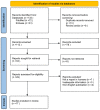Effects of exercise interventions on negative emotions, cognitive performance and drug craving in methamphetamine addiction
- PMID: 38827441
- PMCID: PMC11140390
- DOI: 10.3389/fpsyt.2024.1402533
Effects of exercise interventions on negative emotions, cognitive performance and drug craving in methamphetamine addiction
Abstract
Introduction: Methamphetamine is currently one of the most commonly used addictive substances with strong addiction and a high relapse rate. This systematic review aims to examine the effectiveness of physical activity in improving negative emotions, cognitive impairment, and drug craving in people with methamphetamine use disorder (MUD).
Methods: A total of 17 studies out of 133 found from Embase and PubMed were identified, reporting results from 1836 participants from MUD populations. Original research using clearly described physical activity as interventions and reporting quantifiable outcomes of negative mood, cognitive function and drug craving level in people with MUD were eligible for inclusion. We included prospective studies, randomized controlled trials, or intervention studies, focusing on the neurological effects of physical activity on MUD.
Results: Taken together, the available clinical evidence showed that physical activity-based interventions may be effective in managing MUD-related withdrawal symptoms.
Discussion: Physical exercise may improve drug rehabilitation efficiency by improving negative emotions, cognitive behaviors, and drug cravings.
Systematic review registration: https://www.crd.york.ac.uk/PROSPERO/, identifier CRD42024530359.
Keywords: anxiety; cognition; depression; drug craving; methamphetamine use disorder; physical exercise.
Copyright © 2024 Xu, Zhang, Hou, Wang, Li, Ma, Wang, Luo and Zhu.
Conflict of interest statement
The authors declare that the research was conducted in the absence of any commercial or financial relationships that could be construed as a potential conflict of interest.
Figures
Similar articles
-
Protocol for the methamphetamine approach-avoidance training (MAAT) trial, a randomised controlled trial of personalised approach bias modification for methamphetamine use disorder.Trials. 2021 Jan 6;22(1):21. doi: 10.1186/s13063-020-04927-6. Trials. 2021. PMID: 33407781 Free PMC article.
-
The transcranial direct current stimulation over prefrontal cortex combined with the cognitive training reduced the cue-induced craving in female individuals with methamphetamine use disorder: A randomized controlled trial.J Psychiatr Res. 2021 Feb;134:102-110. doi: 10.1016/j.jpsychires.2020.12.056. Epub 2020 Dec 22. J Psychiatr Res. 2021. PMID: 33383492 Clinical Trial.
-
Cognitive and emotional predictors of real versus sham repetitive transcranial magnetic stimulation treatment response in methamphetamine use disorder.J Psychiatr Res. 2020 Jul;126:73-80. doi: 10.1016/j.jpsychires.2020.05.007. Epub 2020 May 12. J Psychiatr Res. 2020. PMID: 32422456 Clinical Trial.
-
Effects of exercise of different intensities on withdrawal symptoms among people with substance use disorder: a systematic review and meta-analysis.Front Physiol. 2023 May 10;14:1126777. doi: 10.3389/fphys.2023.1126777. eCollection 2023. Front Physiol. 2023. PMID: 37234417 Free PMC article.
-
Behavioural modification interventions for medically unexplained symptoms in primary care: systematic reviews and economic evaluation.Health Technol Assess. 2020 Sep;24(46):1-490. doi: 10.3310/hta24460. Health Technol Assess. 2020. PMID: 32975190 Free PMC article.
References
-
- United Nations Office on Drugs and Crime . World Drug Report 2023. United Nations publication: The United Nations Office on Drugs and Crime (UNODC; (2023).
-
- Martinotti G, Merino Del Villar C, Garcia Cordoba A, Andrés Tubau L, Castro Sánchez I, Di Carlo F, et al. . Club drugs and psychiatric sequelae: an issue of vulnerability and previous psychiatric history. Int J Environ Res Public Health. (2021) 18:6944. doi: 10.3390/ijerph18136944 - DOI - PMC - PubMed
Publication types
LinkOut - more resources
Full Text Sources


